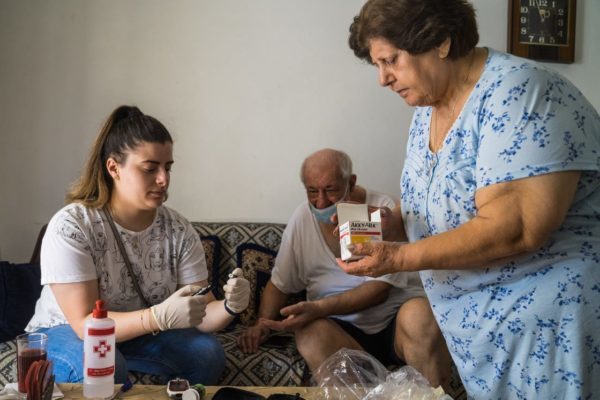By Clément Gibon,
In their house in Achrafieh, which still bears the traces of the Beirut blast, 79-year-old Habib Copti, and 75-year-old Elham Copti, are counting the last medicine boxes to treat their different conditions.
“There are days when I can take my medication and others when we no longer have the necessary quantities. This forces us to have to skip doses. Sometimes we must mix different brands of medication to make sure we are getting the desired effect,” Habib said.
“The situation has worsened for my wife and I, but what can we do? Maybe other people are suffering even more than us,” he added.
Retired for a little more than ten years with their assets blocked in the banks due to the ongoing crisis that the World Bank has described as one of the most severe crises episodes globally since the mid-nineteenth century, they told Al-Arabiya English their increasingly complicated access to medication needed to treat their diabetes, hypertension and blood circulation problems.
“Before the crisis, Glucophage to treat diabetes cost 40,000 to 60,000 Lebanese Lira. It has risen to 300,000 Lebanese Lira and is unavailable in the country.”
“It is also difficult for us to go from pharmacies to pharmacies to find the drugs because of the price of gas and our many health problems.”
The lifting of subsidies on many drugs across the country by the Lebanese Ministry of Public Health (MOPH) led to a sharp rise in the price of medicine. Many drugs became unavailable or unaffordable for a large part of the population.
Majority of families experience medicine price hikes
While its report on relief highlighted that more than half of the families in Lebanon could not obtain the medicines they needed, UNICEF noted that more than nine out of 10 families surveyed had experienced an increase in the price of medicines.
For 28-year-old pharmacist Roni Haber, who works in the Bou Khalil pharmacy and who recently volunteered to help the Nation Station clinic, which takes in patients for a free diagnosis, the problem of access to medicines is twofold.
“Not only are the patients facing a shortage of medicines, but their prices have tripled or even risen fivefold for some more. A lot of patients are switching to some kinds of generic brands that are more affordable, but not all brands have a generic equivalent in Lebanon ,” he said.
As a result, many people must buy medicines in neighboring countries such as Syria, Jordan, or Turkey or rely on their families living abroad, in the US, Europe, or the Gulf countries, to receive their treatments. However, with salaries not exceeding 675,000 Lebanese pounds [24$], access to medicines remains very uncertain.
In Beirut, Marina el-Khawand, a 20-year-old student who started the Medonations aid group to help with the medical needs of Lebanese citizens, receives hundreds of telephone calls every month from patients.
“Every day, we register a new patient. For the past two years, we have been treating at least 450 per month, and we can receive up to 1,000 patients. Last month, as many as 966 patients came in for medication,” she says.
Due to the lack of access to affordable medicines, the Lebanese population is turning to NGOs, which are becoming increasingly saturated. For some diseases, such as cancer patients, treatment cannot wait. Last June, the committee protested in front of the parliament to ask the government for access to affordable triage.
“You can’t tell a cancer patient to wait a month to get their medication. That’s like telling them to die. Yesterday, we saw a case of a cancer patient asking for an online donation of $30,000 for her treatment, then $70,000 for surgery, and $26,000 for medication. Who can pay this kind of exorbitant price?” she said.
“This basic right to get your medicine should be available to every human being on this planet; it’s not something you have to beg or strike to get,” she added.
Medical professionals are leaving Lebanon for pastures new
In addition to the lack of medicines, access to prescriptions and care is becoming more complicated. With the dollarization of more sectors in the country, patients cannot pay hospital fees or obtain appointments with doctors.
At the same time, the exodus of qualified Lebanese doctors and nurses, estimated at thirty to forty percent by Dr. Tedros Adhanom Ghebreyesus, director general of the World Health Organization (WHO), leaves the medical sector with few resources.
“If you go to the hospital and don’t have money, they don’t care about you. They ignore you,” said el-Khawand.
“The health system has collapsed, the government just puts plasters on the scratches, but later they will realize that everything has collapsed,” she added.
Nevertheless, there are ways to improve the medical sector. The various health professionals interviewed for this article recommend stopping imports, which are unaffordable, and investing in local productions of medical equipment and medicines.
According to the Ministry of Public Health, Lebanon imports around 80 percent of its pharmaceutical products, representing an annual expenditure of more than one billion dollars.
With these 12 local drug producers registered with the Union of Pharmaceutical Manufacturers, the country, which already produces around 21 percent of the total generics available on the market, could reduce its imports, making medicines widely available and cheaper.
Until the government invests in these manufacturing facilities, the availability and affordability of medicines for the Lebanese population will remain uncertain.
“We have the production, we have the resources, we know, we have the human skills, but we need the hand of this corrupt government to work and stop stealing money. I can’t find the words to describe what can happen in the future,” said el-Khawand.
“The situation is worse than before, and people are dying at home because they didn’t take their medicine,” she concluded.
(Al Arabiya)


Leave a Reply
You must be logged in to post a comment.